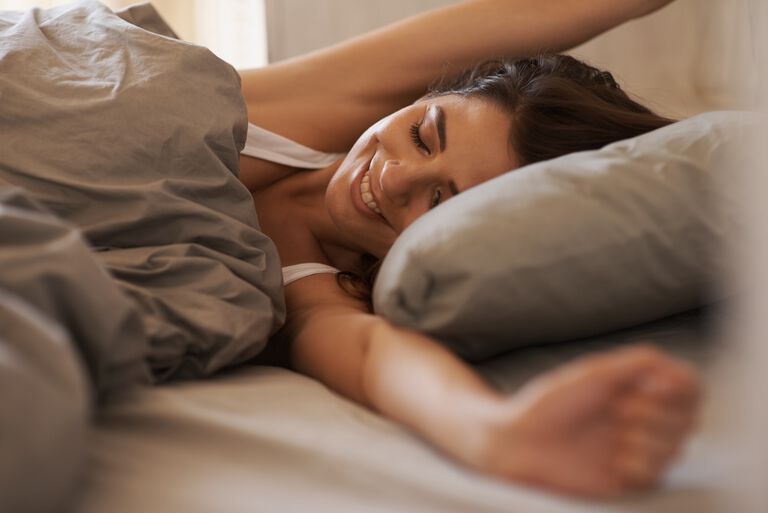How sleep can support weight loss

Losing weight or getting in shape is a common new years’ resolution, with gym membership signups and diet plans increasing significantly in January. According to Puregym’s 2024 fitness report, January is the busiest month to visit the gym while the quietest month is December – to no one’s surprise![1]
But did you know that sleep and weight loss are linked? When we think about how to lose weight, most people immediately think of diet and exercise, but not getting enough quality sleep can hinder the impact of your efforts. Read on to find out why sleeping well can help you hit your weight loss goals.
Does a lack of sleep cause weight gain?
According to the Sleep Foundation, one of the many important things sleep does for our body is help us to regulate our appetites, by controlling the production of the hormones ghrelin and leptin which signal to our bodies when we are hungry and when we are full respectively. [2]
Not sleeping enough can knock the balance of these hormones, leading to you feeling hungrier and not feeling full as quickly, which can ultimately end in you eating more than you need to, potentially leading to weight gain. Plus, research has shown that sleep-deprived individuals typically crave more high calorie foods, so sticking to your diet could get a lot more difficult if you haven’t had enough sleep.
What’s the best time to sleep to lose weight?
According to the Sleep Foundation, early to bed and early to rise is the way to go. People who sleep later are likely to consume more calories compared to early risers, and early birds may be more likely to keep the weight off.
Can you burn calories while you sleep?
Technically, yes, you do burn calories while you sleep. The Sleep Foundation estimates that we burn around 50 calories an hour on average while we’re asleep – unfortunately not quite enough to be a complete weight loss strategy on its own! [3]
How to sleep better for weight loss
Now you know why sleep is so important in supporting weight loss, you may be wondering how you can get the most for it. Here’s a few tips to make sure you’re getting enough rest without jeopardizing your weight loss plans.
Timing exercise right
Most people know that exercise can help you lose weight, but exercise can also help you sleep better too. On the flipside, getting enough sleep is also important to help you hit your exercise goals, as you’ll struggle to put 100% into a workout if you’re tired.
If hitting the gym is part of your weight loss plans, it’s important to make sure you choose a time to exercise which won’t jeopardise your sleep. NHS Inform recommends finishing any vigorous exercise at least 2 hours before you intend to go to bed so that your body and brain have ample time to relax in time for bed. Therefore, exercising in the morning or early evening should make sure you’re all relaxed in time for bed.[4]
Make your bedroom comfortable
The right sleep environment is essential if you want to get good rest. The ideal bedroom is approximately around 18°C and dark. An eye mask can be helpful if your curtains or blinds don’t keep all the light out, and a temperature-regulating duvet could help prevent overheating.
It’s also vital to make sure that your mattress and pillow are right for you. The ideal combination should help keep your spine aligned, so you feel comfortable during the night. Our SmartCool™ Mattresses also help you maintain an optimum temperature at night by absorbing excess body heat, so you can be both cool and comfortable.
Find time to unwind
Switching off at the end of a busy day isn’t easy when you’re still thinking about the stresses of the day and the day ahead. To help you get ready for sleep, the Sleep Foundation recommends switching your devices off or use a blue light filter ideally two to three hours before bed – this is to reduce the amount of blue light you’re exposed to before bed, which makes you feel more alert.[5]
Instead of using your devices, gentle activities like reading, stretching or journalling are a great way to relax before it’s time to turn the light out.
Watch what you eat (and drink!)
Caffeine and alcohol are notorious for jeopardising a good night’s sleep, so if you want something to drink in the evening, sticking to water or caffeine-free tea will most likely be better for you.
How much and when you eat can also impact how well you sleep as well. The NHS advise avoiding a big meal directly before bed, so it’s a good idea to allow your body enough time to digest before going to sleep.
Sources
(1) https://www.puregym.com/blog/uk-fitness-report-gym-statistics/
(2) https://www.sleepfoundation.org/physical-health/weight-loss-and-sleep
(3) https://www.sleepfoundation.org/how-sleep-works/how-your-body-uses-calories-while-you-sleep
(4) https://www.nhsinform.scot/healthy-living/12-week-weight-management-programme/week-10/
(5) https://www.sleepfoundation.org/bedroom-environment/blue-light
Download our brochure
Want to know more about our story? Download our brochure to see more.

Visit a TEMPUR® store or talk to a sleep expert
Want to know more about TEMPUR®? Either visit us in store or arrange to speak to us today.
Get the latest news and offers
Sign up to receive news and offers about TEMPUR® products. Detailed information on the use and storage of data can be found in the Privacy Policy.


